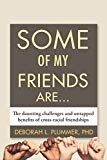
- This event has passed.
Author Talk: Deborah L. Plummer
January 22, 2019 | 7:00 pm - 7:30 pm
FreeEvent Navigation

Harvard Book Store welcomes psychologist, professor, and UMass Medical School chief diversity officer DEBORAH L. PLUMMER for a discussion of her latest book, Some of My Friends Are . . . The Daunting Challenges and Untapped Benefits of Cross-Racial Friendships.
About Some of My Friends Are . . .
Surveys have shown that the majority of people believe cross-racial friendships are essential for improving race relations. However, further polling reveals that most Americans tend to gravitate toward friendships within their own race. Psychologist Deborah L. Plummer examines how factors such as leisure, politics, humor, faith, social media, and education influence the nature and intensity of cross-racial friendships.
Inspiring and engaging, Plummer draws from focus groups, statistics, and surveys to provide insight into the fears and discomforts associated with cross-racial friendships. Through personal narratives and social analyses of friendship patterns, this book gives an insightful look at how cross-racial friendships work and fail within American society. Plummer encourages all of us to examine our friendship patterns and to deepen and strengthen our current cross-racial friendships.
Praise
“If you have ever wondered why genuine cross-racial friendships are challenging to develop and maintain in our racially polarized society, and why they are essential to racial reconciliation, read this thoughtful book!” —Beverly Daniel Tatum, author of Why Are All the Black Kids Sitting Together in the Cafeteria? and Can We Talk About Race?
“We know that seemingly incidental features of our lives can—by provoking a sense of identity threat—act as small barriers to crossing racial lines in friendship. In Some of My Friends Are . . ., Dr. Plummer identifies these cues and charts a pathway to establishing more friendships that heal divisions among racial groups. In doing so, this book offers hope for a better and more inclusive tomorrow.” —Claude Steele, author of Whistling Vivaldi: How Stereotypes Affect Us and What We Can Do
“Dr. Plummer challenges us to continue to have dialogues on race. This necessary and meaningful discourse is for the benefit of all humankind. Her book reminds us that the evil of racism is almost omnipotent and we must be steadfast in working to overcome it.” —The Reverend Dr. Otis Moss Jr., American pastor, theologian, speaker, author, and activist
Did You Know?
Certain books were “banned in Boston” at least as far back as 1651, when one William Pynchon wrote a book criticizing Puritanism.